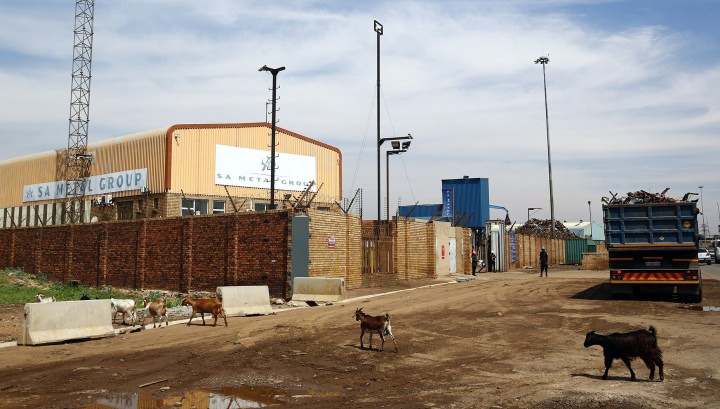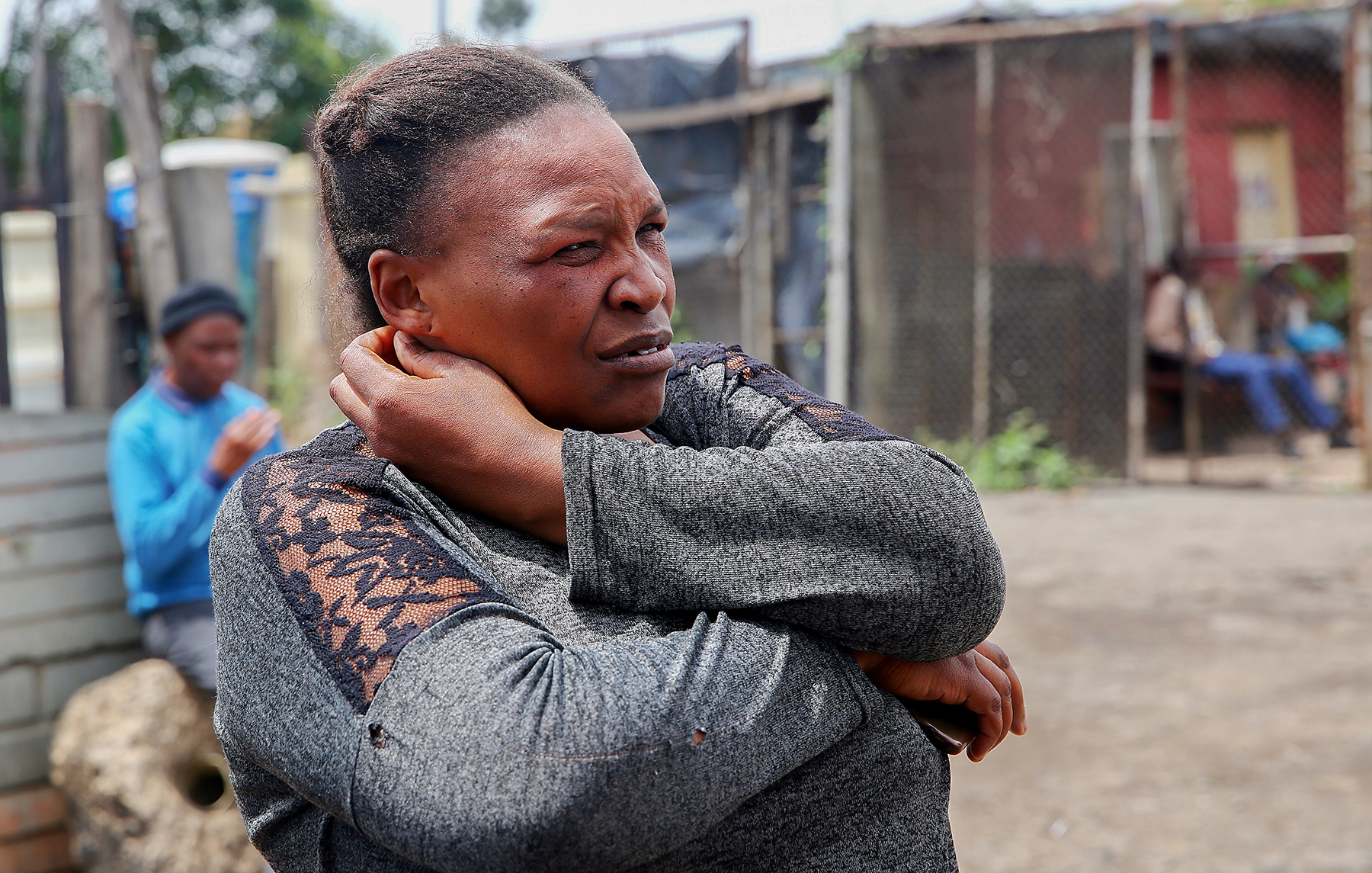BURDEN OF ILLNESS
‘You can taste the metal’ – dust from recycler is making us sick and nobody’s listening, say East Rand shack dwellers

Residents of the Good Hope informal settlement in Germiston say they are suffering from respiratory illnesses, health complications and grave bodily injuries caused by the metal recycling company across the road.
It’s a warm day in the Good Hope Informal settlement in Germiston on the East Rand in Ekurhuleni, despite this week’s rain making the paths muddy as there is no proper sanitation or irrigation system. Residents say the rain brings relief from the red dust emitting from the metal recycler across the road.
“Normally you can see the red dust over the settlement like a cloud. It sits on all surfaces in our homes, you can’t leave your food out for long after you have dished up because the dust sits on it and you can taste the metal. The food is grainy like sand as well. It’s much better after rain, it doesn’t go up,” says Luyanda Fitshane, a land activist and resident.
As we are speaking there are continuous loud clunks and bangs coming from across the road. It sounds like a huge hammer striking metal. On their website, SA Metal Group says it buys, collects, processes and recycles all ferrous metals (iron and steel) and non-ferrous metals including aluminium, copper, zinc, stainless steel, lead, nickel, brass, tin and bronze. The recycler has been working from the plot for a decade, according to the residents, who say there was another company there before that didn’t emit as much dust in its daily operations.
The company had allegedly operated on another plot near a residential area in Olifantsfontein, where residents complained about the noise and air pollution. Fitshane says the fact that it was moved to their area is a clear sign that “we get no consideration because we live in shacks and not brick houses. It’s as if we are not human or have any rights because this would not go on in another neighbourhood.”
Shiny menace
The residents say the dust affects their quality of life. Nontetho Apolisi (45) says she has spent a lot of money changing sinusitis medication for her son, while other residents have more-severe respiratory illnesses.
“We have to clean consistently. You sweep and there is metallic dust that is even shiny. In hot times such as these we only wash our clothes at night, otherwise the dust sits on it and your clothes get dirty and you can feel it on your skin. Some break out in rashes after putting on those clothes. People with TB, asthma and heavy sinus like my son are affected, the dust is making people sick,” claimed Apolisi.
Read in Daily Maverick: “Much to be done to improve air quality in parts of South Africa”
Interim director of the Environment and Health Research Unit at the South African Medical Research Council (SAMRC) Renée Street says the health implications of metal-infused dust being ingested or penetrating the lungs can be severe.
“Metal particles emitted from any point source may lead to deposition in soil and dust. Dust with elevated concentrations of toxic metals such as lead (Pb) may increase the risk of human exposure and uptake of such metals, with an elevated risk of associated harmful health effects. Young children are often particularly vulnerable to such exposures,” Street said.

Good Hope resident Georgina Mohlomodi says her grandson was diagnosed with pneumonia, which she believes it is linked to blasts from the recycling plant. (Photo: Denvor de Wee)
“Dust particles, especially very fine particles such as PM10, PM2.5 and PM1.0, may penetrate deep into the lungs, with consequent respiratory effects. Should there be elevated concentrations of metals in dust, there is also an increased risk of associated harmful health effects.”
The Good Hope settlement has been around since 1995, yet there is very little development, each shack or house has a blue portable toilet squeezed into its small yard. Lives are lost to shack fires every winter. Residents say their calls for help from local leaders fall on deaf ears. They were once promised relocation to 800 flats, but Fitshane says that never came to fruition, and even if it had, more than 4,000 residents in the area would still be without proper electricity, water, housing and sanitation.
Sickly toll
Georgina Mohlomodi (69) says she can’t sleep because of the constant noise that is so loud it sounds like it’s inside her three-bedroom house, which is right by the road. She is fatigued, has high blood pressure and headaches because of the emotional toll. Mohlomodi, who has lived there since 1996, says her health has taken a knock as the recycler runs 24/7. But she feels mostly for her nine-year-old grandson who has grown up in the dust and was recently diagnosed with pneumonia.
Visit Daily Maverick’s home page for more news, analysis and investigations
“We are suffering here, it is unbearable. My child, Sibonelo, gets so sick and we didn’t know what was wrong. We went up and down trying to find out, but now we got medication from Germiston Hospital for pneumonia. We hope it will help,” she says.
The burden of illness in a community with high unemployment is dire since transport to basic healthcare can cost R100 or more. On top of that, as in Mohlomodi’s case, repeat visits to the hospital are required for check-ups and medication. The return trip is R76, but she has to buy food for the long queues so in a month the cost can swallow up to half of Sibonelo’s child grant.

Luyanda Fitshane, a land activist in the Good Hope informal settlement, says they have many service delivery challenges. (Photo: Denvor de Wee)
What the experts say
Is there a rule in South Africa for how far recyclers, dump sites and mines must be from communities to prevent ill health?
Street says “buffer zones between sites of pollution and human settlements help protect the health of communities”. The Gauteng government had issued guidelines for such zones, but these were “not mandatory, to my knowledge”.
The SAMRC had done studies to provide evidence for the need for action “(mainly to assess the risk of exposure to environmental hazards, and to elucidate the association between environmental exposures and health), including the institution of mandatory buffer zones between pollutant-generating activities and human settlements”.

Nonthetho Apolisi says her son has severe sinus problems and shortness of breath due to the dust from the recycling plant. (Photo: Denvor de Wee)
Asked what residents can do to protect their health, as well as what the company can do, Street suggests: “For communities or individuals, interventions include hand washing, especially before eating and after playing; dusting regularly; greening or paving areas may also reduce exposure to dust. The company (formal industry) should have a licence to operate. The company would need to comply with emission standards set out by the DFFE (Department of Forestry, Fisheries and the Environment).”
No response
Maverick Citizen reached out to SA Metal group via phone on Tuesday and was given different email addresses to send queries to which had not been responded to by the time of publication. On Thursday DM was told, “I forwarded the email to my boss, he said he will respond when he is ready or has time,”
The local Councillor Jeff Mthembu also was waiting for his ANC Chief whip to approve his responses and forward them to us
Jerry Chaka from the environmental health department at the City of Ekurhuleni said he could only respond to queries after doing their own investigation.
“We will check the process on the ground, who is the culprit, whether that area has been demarcated or zoned for that kind of an operation. Then (we’ll) define environmental health hazards and talk to the person to stop those things, issue a notice in writing. It can take seven to 14 days depending on the professionals on the groundwork, then we do a follow-up on whether our notice was acknowledged. If needs [be] we can include corporate and legal to see which laws have been transgressed. We are usually able to resolve before we get to legal, but the assessment will let us know what’s happening,” said Chaka.

Nokia Somazane says her brother died in a shack fire at the Good Hope informal settlement. (Photo: Denvor de Wee)
Meanwhile, residents including Lamula Mgodo believe they have paid the ultimate price because of the dust. Early in 2021 his daughter was born prematurely at six months but was discharged early because she was healthy and at a good weight. However, despite her health, he says, his environment was not suitable for a premature child.
“The nurses asked what kind of place I live in. I explained that we live near SA Metal in Germiston. They said the dust was dangerous for her and may have caused her coughing and shortness of breath. She didn’t cough for long – we got worried when she cried without her voice coming out, like she was being choked. We took her to the hospital and she never came back,” says Mgodo.
He says he never tried to report the issue, because he was grieving. “We are in pain. Sometimes when I think of my child while I’m trying to sleep. I just find myself crying.” DM/MC



















This company has been on the site for over a decade
The shack dwellers set up home next to them afterwards. Whilst you have sympathy for the shack dwellers uncontrolled land invasions and building of squatter camps where ever has consequences.
Drive around what area and see the number of shacks built on mine dumps that contain poisonous chemicals, that is detrimental to health
As an aside, Eskom had to go and disconnect illegal power connections in the area last week as the ground was becoming “electrified ” and people were being shocked.
This lead to Violent protests cars being stoned and the lower Boksburg rd being closed.
Indeed a sorry situation but Ian has crystallised the underlying cause of this particular and virtually all the same situations around the country. The government has no plan nor the competences to control illegal squatting nor unfettered migration to the main centres-from within and outside SA. Wherever industry builds and operates it will be quickly surrounded by such informal developments with the same outcomes. SA doesn’t have a plan for decentralisation (cue cries of derision-what about the many industrial zones set up in the former homelands?) nor the courage to take issue with countries to the north whose governance is driving immigration to SA. Again not politically correct but all nations should have a “population plan” to define the type of nation it wishes to be, numbers, skills and all that flows from that-education, business development etc. Much as one can empathise with activist organisations such as Ground Up and DM’s own social commentators, their sniping and bleating do not address these fundamental issues nor offer sustainable and lasting solutions.
This is a direct result of uncontrolled settlement and land invasion. The failure to be able to understand or apply spatial planning and zoning requirements. Industrial areas are designated with a buffer zone for a reason, and although release of substances into the environment cannot be condoned, one cannot expect the same level of control as in a residential area.